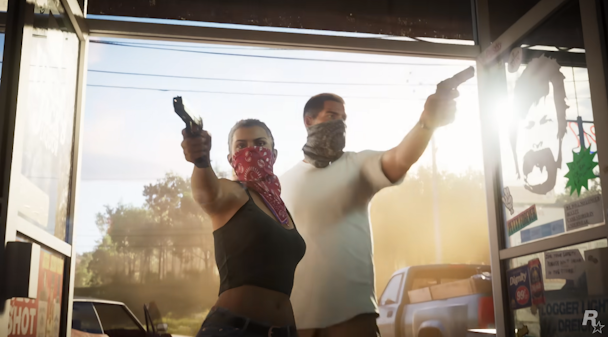6 lessons brands can learn from the world of gaming
Waste Creative’s Hannah Eates reflects on the lessons non-endemic brands can take from gaming as part of The Drum’s Entertainment Focus.

After the comforting monotony of working on an online marketplace account, I was enticed by the creativity and variety that working with video games clients promised. But what I truly fell in love with was the fans.
Gamers are deeply knowledgeable, passionate and skeptical of hype, and need time to be persuaded to care. But once they do, they can be our greatest superpower as collaborators, creators and champions.
I’ve learned a lot about this ‘fan-first’ approach. Now I’m wondering how it could be applied to industries outside of gaming.
Here are six key takeaways…
1: Deliver the familiar in surprising ways
Video games fans are fairly easy to reach en masse - they closely follow new launches through gaming and social media, but only something truly surprising can make them rave when every game is following the same launch pattern and asset types. After game footage was leaked, the GTA VI trailer that followed needed to work extra hard to still surprise fans. Instead of a mere game info dump, it interweaved in-game cutscenes with references to real-life viral moments, becoming a piece of content worth watching in its own right, and earning 96.8 million views in just over nine hours.
Who’s doing it outside of the video games world?
Cybersecurity could hardly be seen as an exciting topic, but 1Password’s Cybersecurity and Skin Care ad doesn’t take itself too seriously. With effortless comedic skills, Ryan Reynolds hits all of the essential selling points of the software app, surprising an audience that was expecting to see a boring infomercial. It’s a rare tech ad that you actually want to watch.
2: Pick a few promises you can keep
Video games fans hate having their hopes raised only to be disappointed. Cyberpunk 2077 felt unmissable as the developers painted a breathtaking image of a game that would propel the whole genre forwards. But when at release players encountered a broken AI and unplayable missions, their disappointment was bitter and loud. It took several years and a lawsuit for the developers to recover. The game should have just focused on a few features it could become famous for.
Who’s doing it outside of the video games world?
Online marketplace eBay has chosen to focus its marketing efforts on individual communities. Its strength lies in people with specific passions - car fanatics, vinyl collectors, vintage enthusiasts, which allows it to avoid a crowded “one-stop-shop” space.
3: Relinquish control and follow the fans
Video games fans demand influence on the games they love. Battle Royale in Fortnite was just another mode before the fans made it the one they leapt on, turning the game into an icon of the genre. Since then, its maker has continued to follow its fans. Now Fortnite has been many things – a music venue, a fashion show and even a Lego sandbox. This ever-changing brand transcends gaming and its product continues to beat its own records with the most recent event attracting over 44 million players.
Who’s doing it outside of the video games world?
Some fast-food brands like McDonald’s follow their communities. It lets fans create their own menus and turn beloved mascots into nightmare fuel with Grimace Shake, inspiring social trends that strengthen brand love.
4: Play a meaningful role in your own fandom
Once it’s relinquished some control to fans, a brand has to work out what part it’s going to play in the ever-shifting fandom. Eve Online has a remarkably long lifespan for an MMORPG, where a vibrant community is vital. From the very start, the developer CCP has seen its fandom as something it belonged to alongside its players, not something they owned or managed. It’s become a sort of neutral facilitator, letting fans self-govern, create their own tools and economy, and write their own history.
Who’s doing it outside of the video games world?
Water brand Liquid Death has created a passionate fandom by becoming a cult leader. Followers around the world are signing contracts to sell their souls, buy exclusive merch and even get tattoos with the brand’s logo, and even sometimes tell us how it is done in The Drum.
5: Value non-purchasers
Many games earn a high percentage of their income from a small percentage of their paying players (the ‘whales.’) Five Nights at Freddie’s never limited its attention only to those who purchased the game, building a vast community of artists, modders and theorists. Not everyone played (or paid), but all contributed to the creation of earned content that took the game further than it could’ve managed on its own. Now FNAF has turned from an indie game experiment into a $1.2bn dollar franchise with a book series and a Hollywood blockbuster.
Who’s doing it outside of the video games world?
It’s difficult to be a movie streaming service with giants like Netflix continuing to lure in with their original content and the cost of living crisis forcing viewers to unsubscribe. Despite that, Mubi is looking beyond its players and building “a community of film lovers.” With its physical magazine, a podcast, merch and cinema tickets, film lovers on any budget can join its 12 million-strong fandom.
6: Support creators, instead of buying celebrities
Video games fans are highly cynical of celebrities with little connection to their games that try to charm their way into their communities. The Sims had its fair share of celebrity and brand collaborations, but it always put its creator community of developers, architects and entertainers first. Everything from its in-game creator content library to big community events is designed to nurture and celebrate creators. Many, who started with nothing more than a unique spin on their favorite game, have built thriving careers thanks to the support of the EA creator network.
Who’s doing it outside of the video games world?
In the world of cosmetics, celebrity partnerships have long become a go-to marketing tactic. Instead of attaching itself to a famous face above the line, Glossier gives a platform to smaller influencers, creating socially native content. This not only creates an authentic connection with fans online but also brings to life its positioning of a beauty brand for real life.
The power behind video games fans’ passion and influence forces us to try harder. But this mindset can be applied outside of gaming, allowing brands to stand out from their competition. Of course, it takes courage to relinquish control of your brand, vision to find your purpose beyond the product and patience to grow a self-sufficient community. But hopefully, this inspires you to find and fuel the passion within your own industry, turning a mere audience into a fandom.

